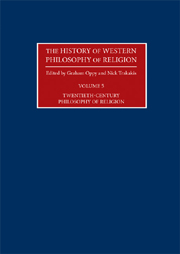Book contents
- Frontmatter
- Contents
- Editorial Introduction
- Contributors
- 1 Twentieth-Century Philosophy of Religion: An Introduction
- 2 William James
- 3 Henri Bergson
- 4 John Dewey
- 5 Alfred North Whitehead and Charles Hartshorne
- 6 Bertrand Russell
- 7 Max Scheler
- 8 Martin Buber
- 9 Jacques Maritain
- 10 Karl Jaspers
- 11 Paul Tillich
- 12 Karl Barth
- 13 Ludwig Wittgenstein
- 14 Martin Heidegger
- 15 Emmanuel Levinas
- 16 Simone Weil
- 17 A. J. Ayer
- 18 William P. Alston
- 19 John Hick
- 20 Mary Daly
- 21 Jacques Derrida
- 22 Alvin Plantinga
- 23 Richard Swinburne
- 24 Late-Twentieth-Century Atheism
- Chronology
- Bibliography
- Index
9 - Jacques Maritain
- Frontmatter
- Contents
- Editorial Introduction
- Contributors
- 1 Twentieth-Century Philosophy of Religion: An Introduction
- 2 William James
- 3 Henri Bergson
- 4 John Dewey
- 5 Alfred North Whitehead and Charles Hartshorne
- 6 Bertrand Russell
- 7 Max Scheler
- 8 Martin Buber
- 9 Jacques Maritain
- 10 Karl Jaspers
- 11 Paul Tillich
- 12 Karl Barth
- 13 Ludwig Wittgenstein
- 14 Martin Heidegger
- 15 Emmanuel Levinas
- 16 Simone Weil
- 17 A. J. Ayer
- 18 William P. Alston
- 19 John Hick
- 20 Mary Daly
- 21 Jacques Derrida
- 22 Alvin Plantinga
- 23 Richard Swinburne
- 24 Late-Twentieth-Century Atheism
- Chronology
- Bibliography
- Index
Summary
Jacques Maritain (1882–1973), maternal grandson of Jules Favre, a leading architect of the Third French Republic, was the only son of a divorced, virulently anti-Catholic, Protestant, rationalist mother, Geneviève Favre and her lawyer husband, Paul Maritain. Maritain spent 1898–9 studying at the Lycée Henri IV, where he became friends with Ernest Renan's grandson Ernest Psichari. In 1900 Maritain began studies at the Sorbonne, where he met his Jewish girlfriend and later wife, Raïssa Oumançoff, as well as Étienne Gilson and Charles Péguy, who took Jacques and Raïssa to attend Henri Bergson's course at the Collège de France. In 1905 he met his spiritual godfather, Léon Bloy. An early and outspoken opponent of anti-Semitism before the Second World War, Maritain was later appointed by Charles de Gaulle as leader of the Free French in the United States and as his representative to President Franklin D. Roosevelt during the war. A political liberal, turned conservative, turned again liberal, maybe turned again conservative, Maritain was actively involved in major political issues of his day. He was a personal friend, among others, of Mortimer J. Adler, Saul Alinsky, Marc Chagall, Paul Claudel, Jean Cocteau, Dorothea Day, Caroline Gordon, Julien Green, John Howard Griffin, Robert M. Hutchins, Walter Lippmann, Gabriel Marcel, Thomas Merton, Pope Paul VI, Yves R. Simon and Allen Tate. After the Second World War, de Gaulle appointed Maritain French ambassador to the Vatican. Together with Gilson, Maritain was a major architect in designing and founding the United Nations and UNESCO, and was a chief author of the UN Declaration on Human Rights.
- Type
- Chapter
- Information
- The History of Western Philosophy of Religion , pp. 105 - 118Publisher: Acumen PublishingPrint publication year: 2009

